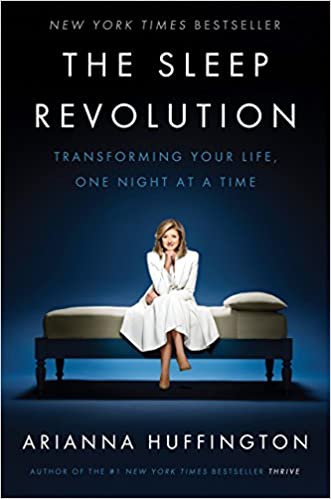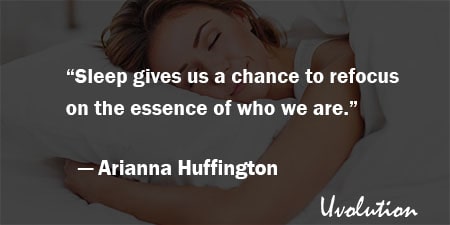The Sleep Revolution by Arianna Huffington
The Book in 1 Sentences
The Sleep Revolution: Transforming Your Life, One Night at a Time
“As I went around the country talking about Thrive, I found that the subject that came up the most—by far—was sleep: how difficult it is to get enough, how there are simply not enough hours in the day, how tough it is to wind down, how hard it is to fall asleep and stay asleep, even when we set aside enough time. ...
It’s clear that if we are going to truly thrive, we must begin with sleep. It’s the gateway through which a life of well-being must travel. ...
I wrote The Sleep Revolution to examine this ancient, essential, and mysterious phenomenon from all angles, and to explore the ways we can use sleep to help regain control over our out-of-kilter lives.
By the time you get to the chapter on tools and techniques, I hope you’ll be convinced of the need to go from knowing what we must do to actually doing it, from awareness to action.” ~ Arianna Huffington
7 BIG Ideas
2. How much sleep should we be getting?
3. How do we move from awareness to action?
4. How to Have a Good Night Sleep?
The Sleep Revolution Book Summary
1. We are How We Sleep
“According to a recent Gallup poll, 40 percent of all American adults are sleep-deprived, clocking significantly less than the recommended minimum seven hours of sleep per night.
Getting enough sleep, says Dr. Judith Owens, the director for the Center for Pediatric Sleep Disorders at Boston Children’s Hospital, is ‘just as important as good nutrition, physical activity, and wearing your seat belt.’
But most people hugely underestimate their need for sleep. That’s why sleep, says Michael Roizen, the chief wellness officer of the Cleveland Clinic, ‘is our most underrated health
habit.’ A National Sleep Foundation report backs this up: two-thirds of us are not getting enough sleep on weeknights. The crisis is global.”
“Sleep is, after all, at the center of our overall vitality. When we sleep well, we feel better, and vice versa. We may be what we eat, but also, to be sure, we are how we sleep.”
2. How much sleep should we be getting?
“The universal, most asked question to end all questions about sleep is inevitably:
How much sleep should we be getting? In 2015, experts from the American Academy of Sleep
Medicine and the Sleep Research Society examined thousands of peer-reviewed articles and
determined that for individuals between the ages of eighteen and sixty . . . a minimum of seven hours of sleep a night is essential for optimal health.”
“Fact: Twenty-four hours without sleep is the equivalent of a blood alcohol level of 0.1 percent—at which point you are more than legally drunk.”
3. How do we move from awareness to action?
“So, where do we go from here? We’ve seen sleep’s profound importance in our lives. We’ve seen the overwhelming scientific evidence on the benefits of sleep. From highways to runways, from the halls of power to our hospitals and schools, we now know the dangers of not getting enough sleep.
But how do we move from awareness to action? How do we incorporate this knowledge
into our lives? It’s not easy, even when we know what we should do. ‘I think that public
awareness is there,’ says Dr. Willis H. Tsai of the University of Calgary. ‘The problem is in the
execution. It’s like eating at a fast food restaurant. You know it isn’t really good for you, but you end up doing it anyway.’
When it comes to our similarly unhealthy sleep habits, how can we stop ‘doing it anyway’? What are the first steps we can take to make changes in our lives?
In a study on what made babies better at walking, scientists discovered that more than height,
brain development, or any other variable, what made the difference was simply how much time babies spent trying to walk.
As Daniel Coyle wrote in The Talent Code, ‘Baby steps are the royal road to skill,’ and this is true for sleep as it is for any other habit.”
4. How to Have a Good Night Sleep?
“From the beginning of time, people have struggled with sleep. As a result, we’ve accumulated
a staggering body of wisdom about it—techniques and tips passed down from generation to
generation.
And we could fill a decent-sized library (or a really spacious thumb drive) with all the sleep advice that’s been amassed in just the last decade in the wake of all the new scientific
research.
There is no silver sleeping bullet that’s going to do the trick for everybody. People’s reasons for not getting enough sleep are deeply personal, specific to their lives and circumstances. And those reasons shift over time.
Still, for those looking to improve their sleep life, it makes sense to begin with some of the scientifically proven general principles for good sleep habits.”
1. Less light!
Arianna quotes Dan Siegel - a Harvard-trained psychiatrist and a clinical professor of psychiatry at UCLA. He says: “People are exposing their eyes to this stream of photons from these objects that basically tell your brain, ‘Stay awake. It’s not time to go to sleep yet.’
So it’s 10 p.m., it’s 11 p.m., it’s midnight—you’re checking for emails, you’re looking for texts—those light beams tell your brain, ‘Don’t secrete melatonin, it’s not time to sleep.’ And you’re up at 12:30, 1, you’re checking some more because you’re up, so why shouldn’t you check?
Now, you go to bed at 1, you wake up at 6 because it’s time to go to work, that’s five hours of sleep.”
“In fact, a 2015 survey showed that 71 percent of Americans sleep with or next to their smartphones. We should think of light, especially blue light, as an anti-sleeping drug or a stimulant—something few of us would willingly give to ourselves each night before bed, especially when so many of us are using sleeping pills or other sleeping aids in a desperate
effort to get some sleep.”
2. Get the temperature right
“The National Sleep Foundation recommends 65 degrees and says that sleep is actually disrupted when the temperature rises above 75 degrees or falls below 54 degrees.”
3. Exercise
“We also sleep better when we make time for regular physical activity in our lives.”
3. Eat right!
Decrease -or eliminate- your intake of caffeine and sugar and alcohol. (Remember that caffeine has a long half-life so, experts say, quit drinking it after 2 p.m.
3. Meditation
“A 2009 Stanford study found that a six-week mindfulness meditation course helped people who have trouble sleeping fall asleep twice as quickly, in fifteen minutes instead of thirty-three minutes.”
Also check the 12 tips from the National Institute for Health. and also check Why We Sleep book summary.
5. Sleep and the Workplace
“Long before our sleep renaissance began, Amazon CEO Jeff Bezos—ahead of the curve in so
many ways—was talking about getting eight hours of sleep. ‘I’m more alert and I think more
clearly,’ he told The Wall Street Journal. ‘I just feel so much better all day long if I’ve had eight
hours.’
In the same article, venture capitalist Marc Andreesen talked about the lessons he learned after his sleep-deprived days launching Netscape: ‘I would spend the whole day wishing
I could go home and go back to bed.’ Now he knows how to get the best out of himself: ‘I can get by on seven and a half without too much trouble. Seven and I start to degrade. Six is suboptimal. Five is a big problem. Four means I’m a zombie.’”
“Boards of directors need to acknowledge that a CEO who’s bragging about getting only four hours of sleep a night is essentially saying that he or she is making decisions while drunk. They need to see that that’s not something to be applauded or rewarded. In fact, it’s a massive red flag.”
Arianna also quotes Warren Buffett who said this in a 2008 Letter to Shareholders of Berkshire Hathaway: “When forced to choose, I will not trade even a night’s sleep for the chance of extra profits.”
6. The Ultimate Performance Enhancer!
“One of her [Cheri Mah, of the Stanford Sleep Disorders clinic and Research Laboratory] most
widely cited studies was published in 2011. Mah had eleven members of the Stanford basketball team wear sleep sensors for two weeks.
She recorded their normal sleep patterns—they averaged just more than six and a half hours each night—along with statistics on sprints, free throws, and three-point shots.
Then, for five to seven weeks, she had them aim for a minimum of ten hours in bed each night, spending as much of the time as possible asleep (‘sleep extension,’ as it’s called).
The players’ sleep average went up to eight and a half hours, and the increases in performance
were dramatic. Sprint times were .7 seconds faster, free-throw shooting went up 9 percent, and three-point shooting increased 9.2 percent.
That’s an amazing difference for such elite athletes— and all achieved just by sleeping more. Ask any athletes you know if they’re interested in shaving nearly a second off their sprint time or increasing their performance in any category by nearly 10 percent, and you’ll have their attention. The study also had participants report their mood, which improved significantly as well.”
“One of the most important findings is that sleep is essentially like bringing in the overnight cleaning crew to clear the toxic waste proteins that accumulate between brain cells during the day.”
7. The Work-Down Call
“The array of sleep-inducing amenities includes ... the work-down call, which is my favorite feature. This is sort of the opposite of a wake-up call—the front desk rings you to tell you that if you’re going to make your bedtime on time, you need to start wrapping things up. And then they even offer tips for how to wind down.
After all, there are few appointments throughout the day that are as important as bedtime. (And if the word ‘bedtime’ sounds childish or embarrassing, feel free not to use it, but remember, there’s nothing childish or embarrassing about being well rested).
Yet our appointment with sleep is one we don’t seem to mind missing, day after day, night after night. When we think of sleep as an actual appointment—a meeting of sorts, with ourselves—we’re much more likely to grant it the time it deserves.
Given that we now set alarms on our smartphones and smartwatches for things of much less importance, the work-down call is a great idea to adopt.”
John Durant -in his book The Paleo Manifesto - also says: “A useful technique is setting an alarm clock—not to wake up, but to get ready for bed. Set an alarm for an hour before bedtime. When it goes off, finish up any work on the computer, turn off the TV, turn off any unnecessary lights, and start to wind down for the day.”
“I have a quote by Ralph Waldo Emerson by my bed that helps me silence my mind: ‘Finish every day, and be done with it. . . . You have done what you could—some blunders and absurdities no doubt crept in, forget them as fast as you can, tomorrow is a new day. You shall begin it well and serenely, and with too high a spirit to be encumbered with your old nonsense.”
That was my QUICK summary of the great book The Sleep Revolution by Arianna Huffington . If you’re interested, get your copy. There is a HUGE amount of life-changing ideas in this book, and we’ve only touched on a tiny bit of it.
Buy The Book: The Sleep Revolution by Arianna Huffington

GET Blinkist 7 Days FREE Trial
3000+ Book Summaries
(Audio and Text)






